At least 30 media workers and citizen journalists are in captivity as a result of illegal detentions, captures, false accusations, and falsified “trials” of the Russian occupiers in the territory of Ukraine.
Disappearance of journalists
Journalists have been under threat since the first days of large-scale Russian aggression in the temporarily occupied territories.
“When Russia occupied the territories of Ukraine, independent media workers became one of the first targets for persecution, illegal detentions, and disappearances,” emphasizes the annual report of the Platform for the Safety of Journalists of the Council of Europe, Press Freedom in Europe: Time to Turn the Tide, for 2023. “The occupation authorities tried to force local journalists to cooperate by means of physical and psychological pressure.”
Objective and truthful information about the actions of the occupation forces is not in the interests of Russia, so journalists in the occupied territories were given a choice: either work for the “new government” or remain silent. Even leaving the territory controlled by the Russian Federation was not an option for everyone.
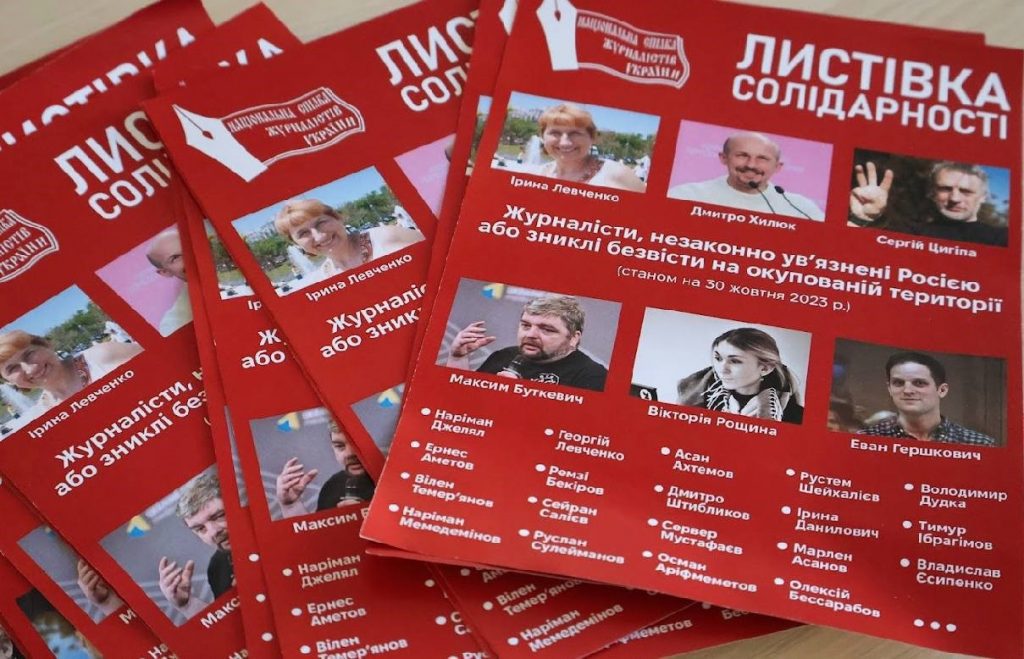
“Russian armed forces have detained and threatened… categories of civilians perceived as opponents of the occupation. Those included journalists, civil servants, officials, and civil rights activists,” the Office of the United Nations High Commissioner for Human Rights said in a March 20, 2024, report. “In total, from February 24, 2022, to December 31, 2023, OHCHR recorded 687 cases of arbitrary detention by the Russian Federation in the occupied regions of Donetsk, Kharkiv, Kherson, Luhansk, Mykolayiv, and Zaporizhzhia (587 men, 92 women, seven boys, and one girl). Many of them were also victims of forced disappearance.”

Oleksandr Hunko, a journalist from Nova Kakhovka, Kherson Region, who was 70 years old at the time of the occupation, had to go through kidnapping, capture, torture, and coercion.
“The occupiers had no idea how real journalism works,” Oleksandr Hunko told the NUJU later after leaving for the territory controlled by Ukraine. “In the imagination of Russians, journalism is synonymous with propaganda. They asked me what instructions the government and the mayor gave me. I tried to explain that there is nothing like that in Ukraine. “No, this cannot be!” the occupiers said in response.
The impossibility of working openly in the conditions of Russian occupation is testified by journalists who passed this test and eventually had to leave for territories controlled by Ukraine – journalists from the Kherson Region Valentyna Fedorchuk, Yevheniya Virlych, Vita Kopenko, the staff of the Novy Den publishing house, journalist from Mariupol Olena Kalaitan and many others.

“A Ukrainian journalist cannot work freely in the occupied territories,” Kherson television journalist Anzhela Slobodian, who survived Russian captivity, emphasized in an NUJU comment. “Journalists who convey truly honest news and defend their civil rights are considered dangerous by the Russian occupiers.”
Journalists claim that their homes were searched on their own, and professional equipment was seized. When the occupiers did not find Kherson journalist Kostiantyn Ryzhenko at home, they detained his younger brother. And in Melitopol, the Russian military took hostage the 75-year-old father of Svitlana Zalizetska, the editor-in-chief of the RIA-Melitopol publication. The man was kept in prison, demanding that the daughter exchange her father for her repentance and cooperation.
Using force, the occupiers forced Berdiansk journalist Serhii Starushka, Melitopol journalists Yevheniya Borian, Yuliya Olkhovska, Liubov Chaika, and publisher Mykhailo Kumko to cooperate. For some time, the TV presenter from Kherson Oleksii Vorontsov, journalists from Luhansk Region Maryna Zhyvotkova and Viktoriya Kaidash, journalist from Volnovakha Lidia Tarash were held captive.
Among the recent abductions is the story of journalist Viktoriya Roshchyna, who was detained twice by the occupiers and, after the second abduction, was still not released.
The fates of Melitopol media persons Heorhii Levchenko and Yana Suvorova remain unknown. They were sneakily kidnapped on August 20, 2023, and Russian propaganda officially announced this only at the end of October 2023.
Detention without trial and investigation
According to Yaroslav Yurchyshyn, the head of the Committee on Freedom of Speech of the Verkhovna Rada of Ukraine [Ukrainian Parliament], the very phrase “captive journalist” sounds inadequate.
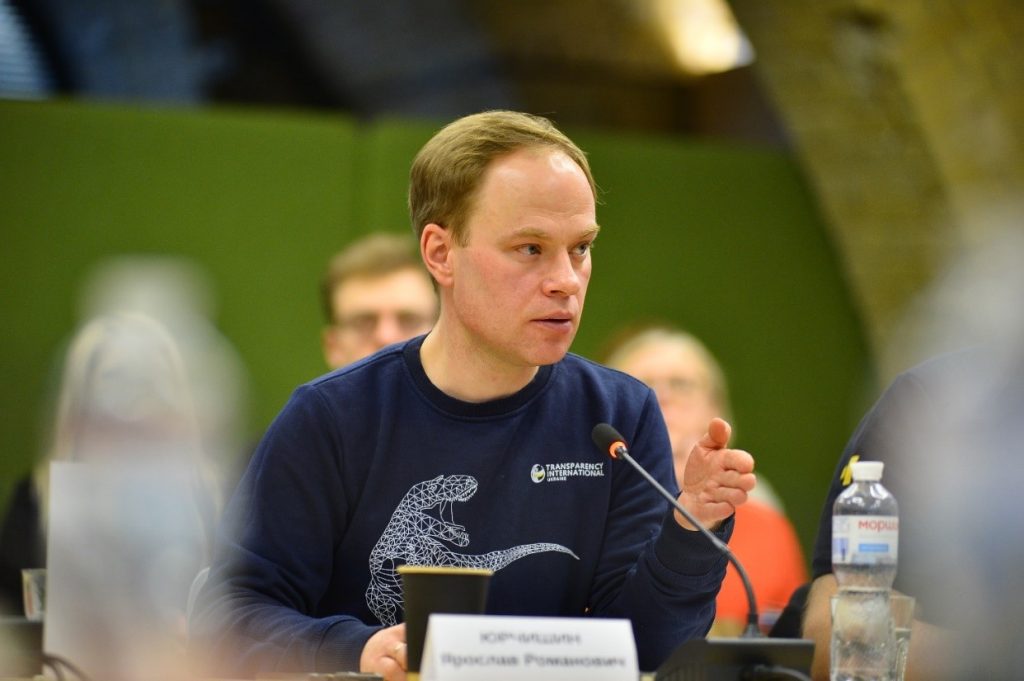
“People marked “PRESS” are not combatants; therefore, they cannot be captured. But in the case of Russia… You yourself understand everything. There is no need to talk about observing the rules of war,” said the politician, emphasizing the importance of releasing and returning journalists captured by the enemy to Ukraine.
The words of Yaroslav Yurchyshyn are confirmed by the facts. According to the information of the Verkhovna Rada Commissioner for Human Rights, Dmytro Lubinets, by the middle of 2023, more than 25,000 Ukrainian civilian hostages were in Russian captivity.
“Russia detains our colleagues on the grounds of ‘countering a special military operation, terrorism, extremism, espionage’ and, taking advantage of legal uncertainty, detains journalists, preventing them from starting the procedure for their release,” explains Lina Kushch, the First Secretary of the NUJU. “While there is no such procedure, we can only resort to companies of solidarity with prisoners and informing the international community.”
A vivid example of how Russian occupiers can keep a civilian prisoner for a long time without a trial or investigation is the fate of UNIAN journalist Dmytro Khyliuk. Reporters Without Borders prepared a special investigation about him. On March 3, 2022, the Russian military captured him in his parents’ house in the village of Kozarovychi in the territory of the then-temporarily occupied Kyiv Region. The man was taken to the territory of Russia, where he was held first in the Novozybkovskoe Remand Prison 2 near the border with Ukraine and then in one of the prisons of the Vladimir Oblast. At the same time, the Investigative Committee of the Russian Federation claimed in an official letter that it “has no information about criminal proceedings” against Dmytro Khyliuk.
“By keeping this Ukrainian journalist, who has not committed any crime, in prison, Russia continues to disrespect the Geneva Convention,” said the head of the investigative department of Reporters Without Borders, Arnaud Froger. “The use of civilians as war booty for “extraction” of information or “brainwashing” adds to the long list of atrocities committed since the beginning of the war. Dmytro Khyliuk is currently a state hostage. He should be released unconditionally.”
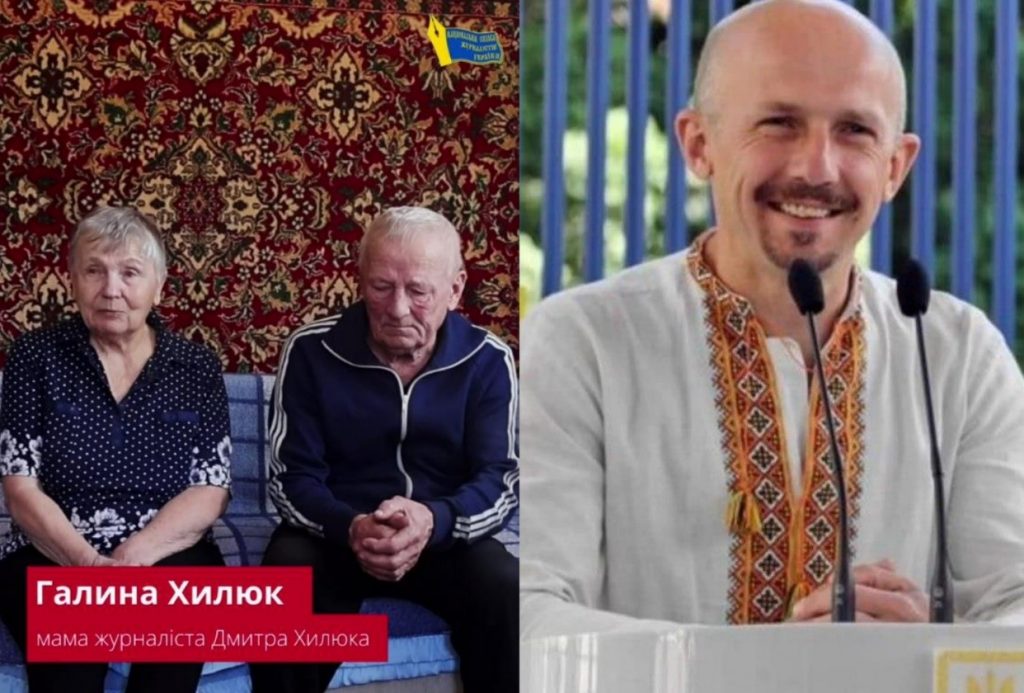
Dmytro‘s mother, Halyna Khyliuk, is convinced that belonging to the journalistic profession is her son’s only “guilt” before the Russian occupiers.
“They keep him for the third year – and it would be for nothing. For being a journalist. We don’t know if any charges have been brought against him, we don’t know where he is… I’m afraid to say I have no hope. We have to hope. I am praying for him,” said Halyna Khyliuk in a comment to the NUJU. “I appeal to the whole world, to all honest people, to the ruling elite. Look at our mutilation, at our disability, at our great years! Free our child from captivity!”
Only at the beginning of April 2024, Khyliuk’s relatives managed to get confirmation from the Ministry of Defense of the russian federation that he was “detained and is in the territory of the russian federation.” However, the reasons for this “detention” are still unknown.
Unfortunately, the practice of abducting Ukrainian journalists by the occupiers has become very common, and not all cases can be talked about today, being sure that it will not harm the captured journalists.
Arbitrariness under the guise of “court”
In the territory of Crimea, which has been under occupation for ten years, the Russian occupiers are trying to institutionalize repression, giving it the appearance of “judicial” decisions.
Realizing that journalistic activity cannot be presented to the world as a crime, the Russian authorities in Crimea imprison journalists on charges of “extremist activities,” “terrorism,” “storage of weapons and explosives,” as well as “espionage.”

As a “spy” in Crimea, even before the start of the large-scale war, Vladyslav Yesypenko, a journalist of the Radio Liberty project, Krym.Realii, was detained. He worked as a freelancer for the Krym.Realii project of Radio Liberty. The journalist condemned the annexation of Crimea and recorded the arbitrariness of the occupation authorities on the peninsula, filmed stories on social topics and public opinion polls on the streets of Crimea, and gave interviews to international media.
“On March 10, 2021, journalist Vladyslav was detained by the FSB as a spy. In fact, Vladyslav was detained for his journalistic activities in the territory of the temporarily occupied Crimea, says the journalist’s wife, Kateryna Yesypenko, in a comment to the NUJU. “For two days, Vladyslav was tortured with electric current, beaten, threatened with murder and promised to have all this framed as suicide, forced to testify against himself, forced to give up the lawyers with whom I signed the agreement.”
Vladyslav constantly claimed torture in the “court.” “They stripped me naked and put wires on my ears. I tried to resist, but since I was alone and in handcuffs, I couldn’t do anything. I was lying on the floor naked; they turned on the wires and let the current flow. The pain was such that my brain was boiling,” the journalist said.

The Russian court in Crimea sentenced Yesypenko to six years of imprisonment in a general regime colony; later, the sentence was commuted to five years of imprisonment. Vladyslav is kept in Colony 2 in the city of Kerch, Crimea.
Vladyslav Yesypenko is a laureate of the 2023 National Ihor Lubchenko Award for Protection of Freedom of Speech, awarded by the NUJU. On Ukrainian and international platforms, the NUJU constantly calls to fight for freedom for Yesypenko and all journalists captured by Russia.

During the years of occupation of Crimea, the Russian administration reduced the activities of professional journalists to nothing. Therefore, coverage of the situation on the peninsula had to be undertaken by citizen journalists – ordinary citizens who spread socially significant information through the channels available to them.
“Citizen journalists appeared against the background of repressive actions. They felt a vacuum of information; besides, many of those who are currently repressed, isolated, and imprisoned are our colleagues, friends, and relatives, and we spent a lot of time in court as listeners. We understood that we had to find a way to help these people, to highlight their stories,” says Crimean journalist and human rights defender Lutfie Zudiyeva.
Four professional journalists are currently held in captivity in Crimea by the decision of the “courts” (in addition to Vladyslav Yesypenko, also Oleksii Bessarabov, Dmytro Shtyblykov, and Volodymyr Dudka, accused of “preparation for sabotage”) and 14 citizen journalists, most of whom are representatives of Crimean Solidarity.
Many of those convicted on the absurd charges of professional and citizen journalists have serious illnesses. Amet Suleymanov suffers from many serious chronic diseases of the heart, lungs, stomach, and joints. Doctors recommended that he replace the heart valve. And Iryna Danylovych, despite a severe ear disease and systematic headaches, does not have access to qualified medical care.
The occupiers use the mechanism of “conviction” of innocent people, developed in Crimea, in the territories captured after February 2022. Thus, journalist and public activist from Nova Kakhovka, Kherson Region, Serhii Tsyhipa, who was “arrested” on March 12, 2022, was sent to Crimea and sentenced to 13 years in prison on charges of “espionage.” At the beginning of April 2024, it became known that Serhii was transferred to the territory of the Russian Federation.
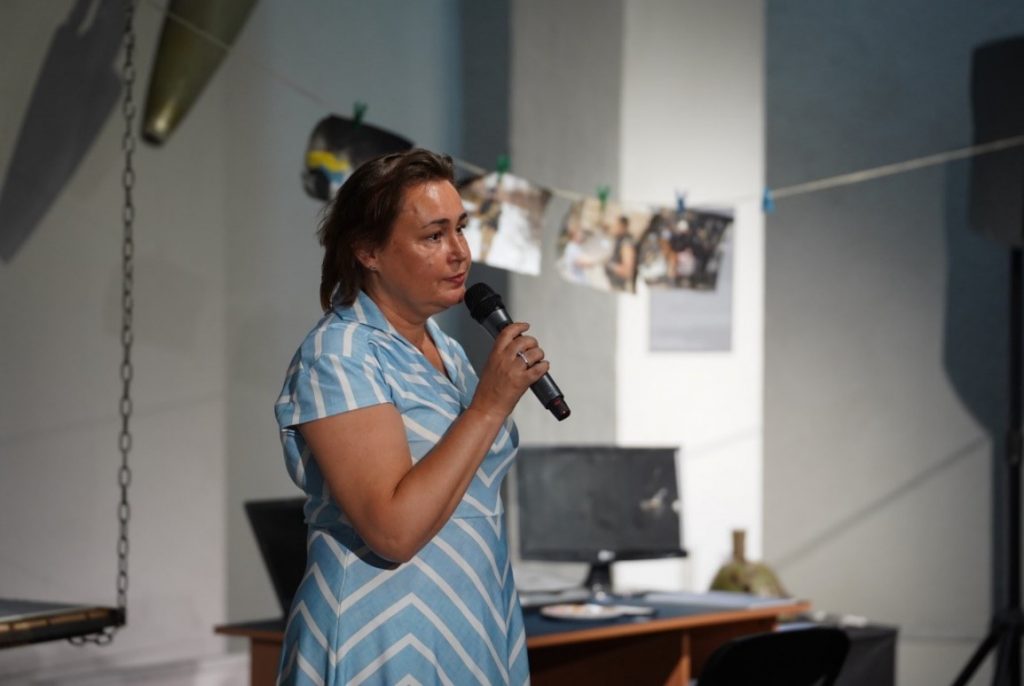
Serhii‘s wife, Olena Tsyhipa, emphasizes: “Serhii was and remains a patriot of his country. He lives on his land. What right did the Russians have to kidnap him and to judge him on absurd charges?”
According to Olena, despite the verdict, she will continue to fight for her husband.
“The National Union of Journalists of Ukraine warmly supports these people,” says the NUJU secretary Mykola Semena, who himself went through a Russian court in Crimea. “Through lawyers, we maintain connection with them, help them maintain contacts with their families.”
Torture and other extrajudicial actions against journalists
The situation with Vladyslav Yesypenko is not unique. There is confirmed data on the use of various types of torture by the occupiers against Ukrainian prisoners – from beatings and humiliating tortures to harsh conditions of detention and restrictions on food, water, sleep, medical and legal assistance, and even fresh air.
“The volume of credible allegations of torture and other forms of cruel, inhuman, and degrading treatment or punishment indicates that torture is an element of Russian military policy,” said the UN Special Rapporteur on Torture and Other Cruel, Inhuman or Degrading Treatment or Punishment, Alice Jill Edwards. “These serious crimes are neither an accident nor a secondary circumstance.”
The fact that the Russian occupation authorities, whose actions are not controlled by any significant institution, can resort to torture and other extrajudicial actions against arrested journalists, about which the international community receives only scanty information, said the deputy director of the global network International Press Institute Scott Griffen.
“The international community must immediately intervene in this situation, forcing the Russian authorities to provide transparency and release all Ukrainian journalists they are holding hostage,” Scott Griffen added.
The National Union of Journalists of Ukraine has testimonies of Ukrainian journalists who managed to escape from captivity about the use of torture and ill-treatment against them.
“Journalists detained in the occupied territories are threatened with torture and extrajudicial killings,” NUJU President Sergiy Tomilenko emphasizes. “The Russian occupation forces keep them in inhumane conditions. There are no protection mechanisms for these people.”

Stanislav Asieiev, a journalist from Donetsk, wrote a whole book about his tragic experience of being held captive in the DPR [Donetsk People’s Republic] in 2017-2019. People were beaten and subjected to extremely brutal and humiliating torture without any fault. According to the testimony of Oleh Baturin, a journalist from Nova Kakhovka, who was in captivity for eight days, he was humiliated morally and beaten, breaking four ribs. A journalist from Kherson, Anzhela Slobodian, says that during her 30-day captivity, she was fed mostly pasta once a day, kept in a stuffy room, and deprived of medicine, medical care, and the opportunity to contact relatives. Behind the door, she constantly heard the screams of people who were being beaten, raped, and tortured with electric current.
“These tortures are very cruel, and the security does whatever they want,” Tetiana Katrychenko, the executive director of the Media Initiative for Human Rights, said in a comment to the NUJU. “They torture with electric current; for example, in the shower, when people are wet, they beat them with stun guns. We know of cases of both sexual violence and rape.”
Unfortunately, not all journalists who were kidnapped and tortured survived. A particularly sad fate befalls the elderly, such as Yevhen Bal, a 78-year-old veteran journalist from Mariupol. On March 18, 2022, the occupiers arrested him in his own apartment. The elderly man was kept “in the basement” for three days, after which, severely beaten, he was released. Yevhen Bal died on April 2.
Testimonies of ill-treatment and deprivation of medical care also come from Crimean journalists who are still behind Russian bars.
Russia’s actions are war crimes
The Geneva Convention for the Protection of the Civilian Population in Time of War (dated August 12, 1949) provides that violence against life and person “are prohibited and shall remain prohibited at any time and in any place.” In particular, that refers to all types of murder, mutilation, cruel treatment, and torture. It is also forbidden to take hostages and to insult human dignity. In the case of being brought to court, this court must be established “properly,” and it must provide judicial guarantees recognized by civilized nations as necessary (Section 1, Article 3 of the Convention).
Guarantees for the protection of the rights of the civilian population in armed conflict are defined by the Geneva Convention on the Protection of the Civilian Population in Time of War. In accordance with Section 1 of Article 3, violence against life and person, including the taking of hostages, is prohibited and shall remain prohibited at any time and in any place against persons not taking an active part in hostilities. In Article 34, documents explicitly state that taking hostages is prohibited.
Taking civilians as hostages, in accordance with clauses viii) clause b) Section 2 of Article 8 of the Rome Statute is a war crime that falls under the jurisdiction of the International Criminal Court. In Ukraine, violation of humanitarian law norms against the civilian population can also be qualified as a war crime (Article 438 of the Penal Code of Ukraine).
In the annual report of the Platform for the Safety of Journalists of the Council of Europe Press Freedom in Europe: Time to Turn the Tide for 2023, it is emphasized that Ukraine remains an “extremely dangerous environment.” “In addition to the number of those killed and wounded, some narrowly escaped death, some “disappeared” under unexplained circumstances, and others who remained in the territories temporarily occupied by Russia or ended up there were detained, imprisoned, and in some cases suffered ill-treatment,” the authors of the report emphasized.

The European Federation of Journalists also insists on the observance of the principle of freedom of speech and human rights for media workers. “We demand the immediate release of journalists who were imprisoned just for doing their job!” emphasizes Maja Sever, the president of the EFJ. The Federation emphasizes the importance of implementing Recommendation 2016/4 of the Committee of Ministers of the Council of Europe on the protection of journalism and the safety of journalists.
The National Union of Journalists of Ukraine, which is a partner organization of the EFJ, declares its solidarity with every journalist held captive by the occupiers.
“Against the background of international journalistic unity, numerous statements of colleagues from different countries of the world in support of media hostages, appeals by the NUJU to create a separate section of the tribunal against Putin – a section of punishment for crimes against journalists – we do not hope that all illegally captured journalists will be free,” said the President of the NUJU, Sergiy Tomilenko. “We call on international organizations, we call on the Ukrainian authorities to strengthen their influence, although it is extremely difficult, on Russia, which does not observe any conventions, any international rules that respect the work of journalists even in war conditions. But we call for increased pressure on Russia to stop war crimes against journalists. We want to bring closer the moment when we are free to congratulate every journalist who, unfortunately, is currently illegally imprisoned by Russia.”
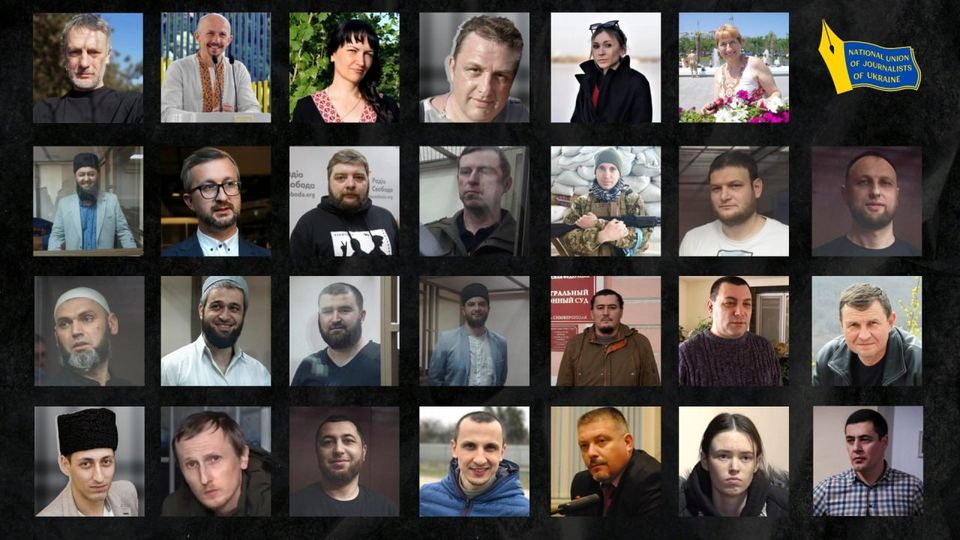
Ukrainian civilian journalists held captive by the Russian Federation:
- Oleksii Bessarabov, a Ukrainian journalist and political analyst / former serviceman of the Ukrainian Navy. He lived in Sevastopol, worked as a correspondent for the publication Hlavred, and collaborated with the analytical center Nomos. He was the deputy editor-in-chief of the magazine Black Sea Security. Detained by the FSB on November 9, 1916, on charges of subversive and terrorist activities. He was subjected to electric current torture. On April 4, 2019, he was sentenced to 14 years of imprisonment in a high-security prison based on an obviously falsified case.
- Dudka Volodymyr, a Ukrainian military sailor, security engineer, and political analyst, collaborated with the magazine Black Sea Security. He was detained by the FSB on November 9, 1916, on charges of subversive and terrorist activities. He was subjected to electric current torture. On April 4, 2019, he was sentenced to 14 years of imprisonment in a high-security prison based on an obviously falsified case.
- Dmytro Shtyblykov, a Ukrainian journalist, reserve officer of the Armed Forces of Ukraine, head of international programs of the analytical center Nomos, and deputy editor-in-chief of the magazine Black Sea Security. He was detained by the FSB on November 9, 1916, on charges of subversive and terrorist activities. In May 2017, under coercion and threats against family members, he entered into a pre-trial agreement, admitting “guilt.” On November 16, 2017, he was sentenced to five years in a high-security prison. On November 8, 2021, when he was supposed to be released, he was arrested on charges of “treason” and left in custody.
- Ernes Ametov, a citizen journalist, actively covered human rights violations in occupied Crimea. He was arrested on October 11, 2017, on charges of participation in the Muslim organization Hizb ut-Tahrir, recognized as a “terrorist” in Russia. He was acquitted on September 16, 2020, but the appeals court overturned the acquittal on March 14, 2022. On December 29, 2022, he was sentenced to 11 years of imprisonment.
- Marlen Asanov (Suleyman), a photographer, popularizer of Crimean Tatar culture, and citizen journalist, actively covered searches and trials. He was arrested on October 11, 2017, on charges of participation in the Muslim organization Hizb ut-Tahrir, recognized as a “terrorist” in Russia. He received a sentence of 19 years of imprisonment in a high-security prison. Because of the conditions of detention and a long stay in the penitentiary, he often gets sick.
- Timur Ibragimov, a citizen journalist, actively covered human rights violations in occupied Crimea. He was arrested on October 11, 2017, on charges of participation in the Muslim organization Hizb ut-Tahrir, recognized as a “terrorist” in Russia. He received a sentence of 17 years of imprisonment in a high-security prison. He has the third group of disabilities; he has an eye implant, which needs to be replaced a long time ago.
- Seyran Saliev, a citizen journalist. He actively covered searches and trials. He was arrested on October 11, 2017, on charges of participation in the Muslim organization Hizb ut-Tahrir, recognized as a “terrorist” in Russia. He received a sentence of 15 years of imprisonment in a high-security prison.
- Server Mustafayev, a human rights defender, one of the organizers and coordinators of Crimean Solidarity, citizen journalist, conducted systematic monitoring of the situation in Crimea and covered politically motivated trials in the media. He was arrested on May 21, 2018, on charges of participation in the Muslim organization Hizb ut-Tahrir, recognized as a “terrorist” in Russia. He received a sentence of 14 years of imprisonment in a high-security prison. He filed a number of lawsuits about seizing the Koran and personal belongings from him, lack of adequate medical care, and other violations by the management of “correctional” institutions.
- Ruslan Suleymanov, a citizen journalist. He covered human rights violations in occupied Crimea. He was arrested on March 27, 2019, on charges of participation in the Muslim organization Hizb ut-Tahrir, recognized as a “terrorist” in Russia. He was sentenced to 14 years of imprisonment in a high-security colony.
- Rustem Sheikhaliev, a citizen journalist, covered human rights violations in the occupied Crimea, primarily “court” processes. He was arrested on March 27, 2019, on charges of participation in the Muslim organization Hizb ut-Tahrir, recognized as a “terrorist” in Russia. Despite serious illnesses (chronic pyelonephritis, prolapse of the right kidney, varicose veins on the legs), he received a sentence of 14 years of imprisonment in a high-security prison.
- Remzi Bekirov, a citizen journalist and correspondent of Grani.ru. He covered high-profile cases against Crimean Tatars in occupied Crimea. He was arrested on March 28, 2019, on charges of participation in the Muslim organization Hizb ut-Tahrir, recognized as a “terrorist” in Russia. He received a sentence of 19 years of imprisonment in a high-security prison.
- Osman Arifmemetov, a writer, winner of literary contests, and citizen journalist. He actively covered searches and court proceedings and helped make transfers to remand prison for unjustly convicted Crimean Tatars. He was arrested on March 28, 2019, on charges of participation in the Muslim organization Hizb ut-Tahrir, recognized as a “terrorist” in Russia. He received a sentence of 14 years of imprisonment in a high-security prison.
- Vladislav Yesypenko, a journalist of the Krym.Realii project of Radio Liberty. He was arrested on March 10, 2021, after filming the laying of flowers at the monument to Taras Shevchenko in Simferopol the day before; for a month, his relatives did not know what happened to him. He was charged first with espionage and later with keeping and transporting an explosive device. He was subjected to torture with electric current and death threats. The journalist was sentenced to five years in a general regime colony. The case of Vladyslav Yesypenko, in fact, became a “methodology” for fabricating cases against other journalists. The journalist is a winner of the 2022 National Ihor Lubchenko Award for Protection of Freedom of Speech.
- Amet Suleymanov, a citizen journalist. He covered human rights violations in occupied Crimea. He was arrested on March 12, 2020, on charges of participation in the Muslim organization Hizb ut-Tahrir, recognized as a “terrorist” in Russia. Despite a serious heart disease (doctors recommended replacement of the heart mitral valve), he was sentenced to 12 years of imprisonment in a high-security prison. He was under house arrest, and after the sentence entered into force (from April 5, 2023) – in prison. He is kept in conditions that contribute to the aggravation of the disease.
- Asan Akhtemov, a Crimean journalist, correspondent, and assistant editor of the newspaper Avdet. He was arrested on September 3, 2021, on charges of blowing up a gas station near Simferopol. He was subjected to torture and psychological pressure from FSB employees. Despite the obvious falsification of “evidence,” he was sentenced to 13 years of imprisonment in a high-security prison.
- Nariman Dzhelal, a Crimean journalist, worked on the ATR TV channel and in the Avdet newspaper. He was deputy chairman of the Mejlis of the Crimean Tatar People. He was arrested on September 4, 2021, on charges of blowing up a gas station near Simferopol. Despite the obvious falsification of “evidence,” he was sentenced to 17 years of imprisonment in a high-security prison.
- Dmytro Khilyuk, a UNIAN journalist. He was captured by the Russian military on March 3, 2022, in his parents’ home in the village of Kozarovychi, Vyshhorod District of the Kyiv Region. No official charges have been brought against him. According to an investigation by Reporters Without Borders, as of July 2023, he was held in one of the correctional institutions of the Vladimir Oblast of the Russian Federation.
- Serhiy Tsyhipa, a public figure and journalist from Nova Kakhovka. He was detained on March 12, 2022, on charges of espionage by the decision of the occupying Simferopol “court” on October 6, 2023, and received a 13-year prison term. On February 14, 2024, the appellate “court” upheld this sentence.
- Iryna Danylovych, a Crimean nurse, trade union and public activist, citizen journalist of the Crimean Process. She was kidnapped in Koktebel on April 29, 2022, kept in the basement, and subjected to torture and intimidation. She was accused of making and keeping an improvised explosive device. She was sentenced to seven years in prison. In prison, her health worsened; she lost her hearing and suffered a stroke. Due to the lack of medical care, she declared a dry hunger strike.
- Yevhen Ilchenko, the administrator of the Melitopol Telegram channel called Mylyi Topol, detained on July 10, 2022, deported to Russia.
- Vilen Temeryanov, a citizen journalist, later a journalist of the publication Grani.ru. He actively covered human rights violations in occupied Crimea. He was arrested on August 11, 2022, on charges of participation in the Muslim organization Hizb ut-Tahrir, recognized in Russia as a “terrorist.” While in prison, he was subjected to a forced psychiatric examination; in addition, the journalist’s eyesight deteriorated sharply. As of April 2024, the verdict has not yet been handed down.
- Iryna Levchenko, a journalist from Melitopol and a journalism veteran. She was detained on May 6, 2023, together with her husband Oleksandr. It is not known for certain what she is accused of and where she is being held.
- Viktoria Roshchina, a freelance journalist, worked with Ukrainian Pravda, Public Radio, and Radio Liberty. She has been in Russian captivity twice. She was first detained in Berdiansk on March 16-22, 2022. Viktoriya disappeared for the second time in the occupied territory, from where she planned to report on August 3, 2023.
- Heorhiy Levchenko, an administrator of the Telegram channel RIA Melitopol. He was arrested by the FSB in Melitopol on August 20, 2023, as a “Ukrainian terrorist.” That data followed from Russian propaganda footage. The whereabouts of the journalist are currently unknown.
- Anastasiya Glukhovska, before the full-scale invasion, was a journalist for the publication RIA Melitopol. She was arrested by the FSB in Melitopol on August 20, 2023, according to a Russian propaganda video. However, the FSB officially does not recognize Anastasiya’s detention. Her whereabouts are unknown.
- Vladyslav Hershon, the administrator of the Melitopol is Ukraine chat, was detained on August 20, 2023. Two and a half months later, his relatives were informed about his detention.
- Yana Suvorova, the administrator of the Melitopol is Ukraine Telegram channel. She was arrested by the FSB on August 20, 2023, as a “Ukrainian terrorist,” according to a Russian propaganda video. Her whereabouts are unknown.
- Rustem Osmanov, a citizen journalist who covered human rights violations in occupied Crimea. He was arrested on March 5, 2024, on charges of participation in the Muslim organization Hizb ut-Tahrir, recognized as a “terrorist” in Russia. The Russian-controlled Kyivskyi District Court of Simferopol (Crimea) chose a preventive measure for him in the form of detention for two months.
- Aziz Azizov, a citizen journalist who covered human rights violations in occupied Crimea. He was arrested on March 5, 2024, on charges of participation in the Muslim organization Hizb ut-Tahrir, recognized as a “terrorist” in Russia. The Russian-controlled Kyivskyi District Court of Simferopol (Crimea) chose a preventive measure for him in the form of detention for two months.
- Hennadii Osmak, a journalist from Henichesk, former editor-in-chief of the New Visit publication. On March 12, 2022, he announced the termination of work in the media. On March 7, 2024, it became known about his detention for “participation in an illegal military group” (“popularization of the terrorist battalion named after Noman Chelebidjikhan). He faces 15 years in prison.
There is also information about journalists who were taken hostage while being in the ranks of the Armed Forces of Ukraine:
- Maksym Butkevych, a human rights defender, journalist, and founder of the Zmina human rights center and Hromadske Radio. With the beginning of full-scale aggression, he was mobilized, and in June 2022, he was captured. In March 2023, he was sentenced to 13 years in prison on a falsified charge of wounding civilians. On March 13, 2024, the Court of Cassation upheld this sentence.
- Oleksandr Hudilin, a journalist of the Mariupol publication 0629.com. With the beginning of a full-scale war, he mobilized for territorial defense and guarded various objects in Mariupol. On April 12, 2022, he was captured. The Donetsk regional organization of the NUJU insists on the immediate release of Oleksandr.
NUJU Information Service

 THE NATIONAL UNION OF
JOURNALISTS OF UKRAINE
THE NATIONAL UNION OF
JOURNALISTS OF UKRAINE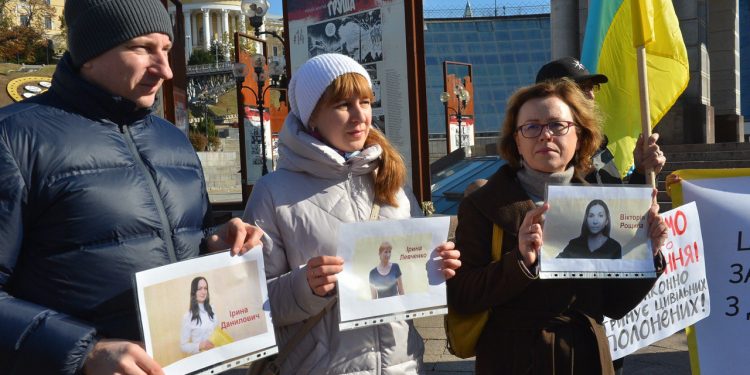
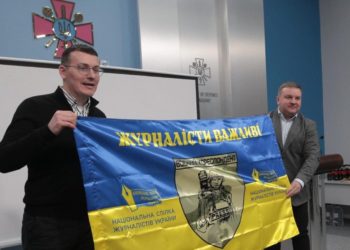
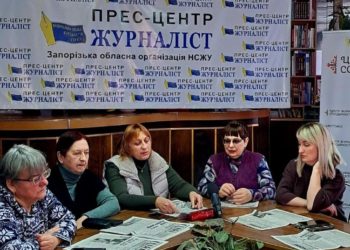
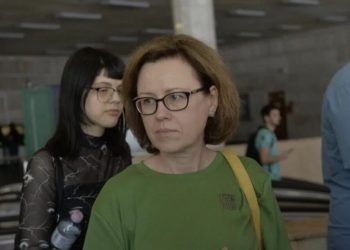













Discussion about this post